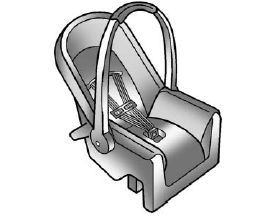Chevrolet Silverado: Engine Exhaust / Running the Vehicle While Parked
Chevrolet Silverado 2019-2026 Owners Manual / Driving and Operating / Engine Exhaust / Running the Vehicle While Parked
It is better not to park with the engine running.
If the vehicle is left with the engine running, follow the proper steps to be sure the vehicle will not move. See Shifting Into Park and Engine Exhaust.
If parking on a hill and pulling a trailer, see Driving Characteristics and Towing Tips.
 Engine Exhaust
Engine Exhaust
Warning
Engine exhaust contains carbon monoxide (CO), which cannot be seen or smelled.
Exposure to CO can cause unconsciousness and even death.
Exhaust may enter the vehicle if:
The vehicle idles in areas with poor ventilation (parking garages,
tunnels, deep snow that may block underbody airflow or tail pipes)...
Other information:
Chevrolet Silverado 2019-2026 Owners Manual: Electric Parking Brake
The vehicle has an Electric Parking Brake (EPB). The EPB can always be activated, even if the ignition is off. To prevent draining the battery, avoid repeated cycles of the EPB when the engine is not running. The system has a or PARK Electric Parking Brake light, and a Service Parking Brake light...
Chevrolet Silverado 2019-2026 Owners Manual: Engine Air Filter Life System
If equipped, this feature provides the engine air filter’s remaining life and best timing for a change. The timing to change an engine air filter depends on driving and environmental conditions. When to Change the Engine Air Filter When the Driver Information Center (DIC) displays a message to replace the engine air filter at the next oil change, follow this timing...
Categories
- Manuals Home
- 4th Generation Silverado Owners Manual
- 4th Generation Silverado Service Manual
- Instrument Panel Fuse Block (Left)
- Lower Anchors and Tethers for Children (LATCH System)
- Driver Information Center (DIC) (Base Level)
- New on site
- Most important about car
Child Restraint Systems

Rear-Facing Infant Restraint
A rear-facing child restraint provides restraint with the seating surface against the back of the infant.
Copyright © 2026 www.chsilverado.com

